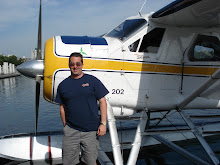Flt Lt Bill Reid VC RAFVR 1921-2001


Flt Lt Bill Reid VC
For one of the bravest actions of the Second World War, Bill Reid was awarded the Victoria Cross. On 3 November 1943, a force of 600 bombers was tasked to bomb Düsseldorf. Reid, flying a Lancaster with his six-man crew, was crossing the Dutch coast at 21,000 feet when his windscreen suddenly exploded. A Bf 110 had attacked from dead astern with cannon fire and not only shattered his cockpit but damaged both gun turrets. Reid, hit in the head and shoulder, as well as having his face cut by perspex splinters, recovered to find that his aircraft had dived nearly 200 feet.
He managed to right the bomber and, saying nothing of his injuries, flew on, but minutes later he was attacked again, this time by a Focke-Wulf 190 which raked the bomber from stem to stern. This attack killed the navigator and mortally wounded the wireless operator, as well as further wounding Reid. As he was to recall:
We were really hit this time, and we started to spin down. Everything went dead in my ears as there was no intercom, nothing. My hands were a bit bloody, skinned, really, when the windscreen had shattered.
Somehow, in the intense cold, Reid managed to control the aircraft with the help of the flight engineer, Sgt Jim Norris, who had been wounded in the arm. The attack had ruptured the aircraft's oxygen system as well as its hydraulics. Reid would have had every right to turn back to Britain, but made the decision to press on with his mission. Without any assistance from his navigator, Reid was in considerable difficulty, but he had committed the route to memory and 50 minutes later he was over his targets. Keeping his aircraft steady, he released his bombs, waited for the automatic photograph to indicate his accuracy and then turned for home, steering by the moon and Pole Star.
Now growing weak through loss of blood and lapsing into unconsciousness, with the aid of Norris and the bomb aimer he managed to keep the plane in the air despite heavy anti-aircraft fire as they crossed the Dutch coast. Then, all of a sudden, all four engines cut out and the plane went into a spin. Norris, light-headed through lack of oxygen, had forgotten to change over the petrol cocks to full engine. Somehow his training took over and he quickly rectified the fault and the engines burst back into full power. Spotting the airfield at Shipdham, Norfolk, Reid circled and flashed his landing lights to indicate his aircraft was in distress. With the hydraulics useless, he had to hand-pump the undercarriage down, which collapsed as he touched the runway. The Lancaster slithered 60 yards before coming to a halt.
The citation for Reid's Victoria Cross reads:
Wounded in two attacks, without oxygen, suffering severely from the cold, his navigator dead, his wireless operator fatally wounded, his aircraft crippled and defenceless, Flight Lieutenant Reid showed superb courage and leadership in penetrating a further 200 miles into enemy territory to attack one of the most strongly defended targets in Germany, every additional mile increasing the hazard of the long and perilous journey home. This tenacity and devotion to duty were beyond praise.
The son of a blacksmith, Bill Reid was educated at Coatbridge Secondary School and joined the RAF Volunteer Reserve in 1940. He trained as a pilot in North America and because of his flying skills worked as an instructor before his first operational flight with 61 Squadron in August 1943. He had only flown nine sorties before the flight which was to change his life.
After recovering from his wounds he was posted to the famous 617 (Dambuster) Squadron, then led by Wing Cdr Leonard Cheshire, later himself to win the VC. Reid was to recall Cheshire with much warmth. On his first flight back, Reid made a pig's ear of the landing and knocked the tail off the plane. Cheshire apologised to him and said, "It's my fault. After all you have been through, I should have given you a few circuits before you flew off." Then he added that he would have to put an endorsement into Reid's book. Many years later, Reid said, laughing, "I think I am the only pilot to get a Victoria Cross on one trip and a red endorsement on the next!"
Reid flew a number of successful raids with the squadron until 31 July 1944. On that day, while attacking a V1 weapon storage site near Rheims, having dropped his own "Tallboy" bomb he was hit by a bomb from a Lancaster 6,000ft above him. The bomb severed all his control cables. Reid gave the order for his crew to bale out, but as he did so the Lancaster went into a sudden dive. He had no option but to bale out himself and landed safely. Taken prisoner of war, Reid found himself in Stalag Luft III before moving to a camp at Belaria. As the Russians advanced, Reid was moved to Luckenwalde, 30km from Berlin. With little food and many dying of exhaustion, Reid was relieved to be released by the Russians.
Bill Reid left the RAF in 1946 and entered Glasgow University. He went later to the West of Scotland Agricultural College before travelling on a scholarship to India, North America and finding New Zealand very much to his liking. In 1950 he joined the MacRobert Trust Farms as an agricultural adviser. He was for 20 years the national cattle and sheep adviser for Spillers Farm Feeds. He retired in 1980 and moved to Crieff with his wife Violet. Theirs was a rich and happy relationship which underpinned the life of this most modest and courageous of men.
Bill Reid was a founder member of the Aircrew Association and an active member of the Victoria Cross and George Cross Association.


<< Home